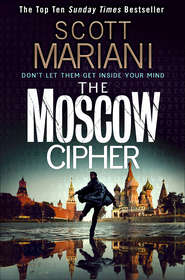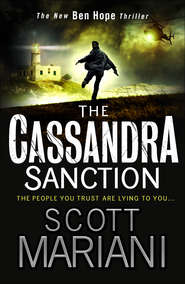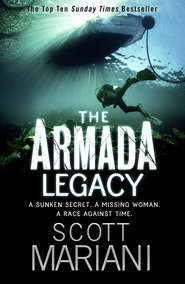По всем вопросам обращайтесь на: info@litportal.ru
(©) 2003-2024.
✖
Scott Mariani 2-book Collection: Star of Africa, The Devil’s Kingdom
Автор
Год написания книги
2019
Настройки чтения
Размер шрифта
Высота строк
Поля
Doubts hovered at the back of his mind, like voices nagging him from deep within his consciousness.
You’re a fool.
You’re going to make it worse.
You’re going to get him killed.
Ben listened to the voices until they grew tired of taunting him. He didn’t try to argue with them. Maybe they were right. But he could see no other way.
Just under six hours after leaving Stuttgart, at ten to three in the morning East Africa Time, the plane landed in a different world.
The tiny airport, little more than a cluster of tin-roofed huts straddling a narrow runway, was no more or less than could be expected in a fragile region still reeling from civil war and slowly crawling towards stability for the first time since the old kingdom of Hobyo was carved out by a Somali sultan in the nineteenth century. After the sultan had made the mistake of letting his nation become an Italian protectorate, it was finally grabbed wholesale by Mussolini’s forces in 1925 and became part of Italian Somaliland until World War Two, when the British took control of the troubled colony. The shaky independence of the new integrated Somali Republic, declared in 1960, had lasted less than a decade before the nation had become mired in bloody revolution and entered a long and brutal cycle of wars and military dictatorships from which it had never fully recovered.
As Ben already knew very well from experience, in such frail and desperately impoverished countries you couldn’t always expect things to go right. And from the moment they stepped onto the cracked runway at Obbia, things started going wrong.
Chimp Chalmers had assured Jeff over the phone that the Land Cruiser would be there to meet them on arrival. Its driver, a local man by the name of Geedi who apparently worked as a taxi driver and courier all over the area, had been put on standby hours earlier, at the same time as the seaplane pilot in Mombasa. But there was no sign of Geedi. Tuesday volunteered to scout around the airport grounds and up and down the road, just in case of a misunderstanding. He returned shaking his head.
‘You didn’t see him?’
‘Saw a hyena,’ Tuesday said. ‘At least, that’s what I think it was. It was eating something dead in the bushes. There’s bugger all of anything in this place. No lights, not a soul in sight. I doubt they see more than a couple of vehicles a day pass through. We’re stuck, guys.’
Three o’clock in the morning in an apparently deserted airport two kilometres away from a town that consisted of a few dismal buildings scattered over a few hundred metres of sand and scrub. It wasn’t a good time or place to be stranded with no transport.
‘What do you want me to do?’ asked Adrien Leroy. He looked edgy and kept glancing about, as if expecting hordes of gun-toting Somalis to appear at any moment and pillage and strip his boss’s precious Gulfstream to a skeleton right before his eyes. His anxieties were probably not all that unrealistic.
‘Just go,’ Ben said to him. ‘I appreciate your bringing us this far. We’ll manage.’
‘Are you sure?’
‘Absolutely.’
As the jet shrieked off into the night, Ben wished he could be so certain. He paced the empty runway and sucked the guts out of a Gauloise while Tuesday sat swinging his legs on one of the big wooden crates, and Jeff got on the phone to unload his anger and frustration on the Chimp. It was a short and unpleasant call, the upshot of which was that the driver must have got the time mixed up and would be with them shortly.
They waited. November temperatures could easily average over thirty Celsius in Somalia, but it could get chilly at night. ‘I never thought you could freeze your arse off in frigging Africa,’ Tuesday complained. Jeff stood with his hands planted on his hips, frowning and looking at his watch every twenty seconds. Ben went on pacing and smoking to pass the time and settle his nerves enough to keep from tearing the place apart, or what little there was of it. The clock in his head was ticking louder than gunfire.
After forty more agitated minutes, they heard the clatter of an approaching vehicle with a loose exhaust, lurching towards them out of the darkness by the light of its single working headlamp. Geedi had arrived. Whether he’d received an angry call to prompt him, or this was simply his idea of punctuality, they would never know. From the weaving, stop-start motion of the ancient Land Cruiser, it was instantly clear that something was up with Geedi.
Jeff stared at the approaching vehicle. ‘Please don’t tell me the fucker’s—’
‘Looks that way to me,’ Ben replied tersely.
The Toyota coasted to a halt approximately nearby. Ben strode up to the driver’s door, yanked it open, and the obese hulk of its occupant fell straight out of the driver’s seat and rolled to the ground, coming to rest with his fat arms splayed outwards and his enormous belly pointing at the stars. Along with him tumbled out an unlabelled open bottle that Geedi had apparently been clasping between his chubby thighs as he drove. It landed on the dome of his stomach, spilling some kind of pungent clear liquor over his grimy shirt. Geedi was too comatose to notice. The inside of the vehicle reeked of kill-me-quick African moonshine.
‘He’s completely fucking pie-eyed,’ Jeff said, shaking his head in disbelief.
Ben grabbed Geedi’s ankles and hauled his limp carcass away from the Land Cruiser. With any luck, he wouldn’t wake up before he got run over by the next plane that landed.
With the equipment crammed into the back of the vehicle, the worn-out rear suspension was down to the stops. The three of them piled in, Ben taking the wheel, and the exhaust gave a death rattle as they took off. The Toyota looked, felt and drove as if it had very few miles left in it, but the port of Hobyo was mercifully close by. Even so, they had to roll the windows down to escape being intoxicated by the alcoholic fumes. Jeff was ranting and cursing Chimp Chalmers. ‘I’m going to kill him.’
‘Let’s just hope the same thing won’t happen with our seaplane,’ Ben said.
‘Yeah, right. If there is a seaplane.’
Chapter 23 (#ulink_e250d7d4-bb94-5b9d-9ffb-8431e1c1d616)
To cut through an armoured steel door that was sturdy enough and thick enough to keep out millions of tons of seawater was a task that took hours. But out here in the middle of the ocean, with no sign of anyone coming to the ship’s rescue, the pirates could afford to take their time.
The torture of waiting had now reached new levels of agony. The passage outside was brightly illuminated with some kind of portable lamps, whose light shone around the twisted edges of the door as the pirates worked. Sparks hissed and fizzed and the super-hot flame from the torch roared. After twenty minutes, the first red-hot spot appeared on the inside of the door. After thirty, the red had turned white and the first sparks were beginning to penetrate the steel. By the end of the first hour, the pirates had cut a five-inch slot along the bottom of the door, slowly working their way up and around to create an oval opening big enough to clamber through.
After the terror, and then the anger, came the crippling numbness. The crew fell into a state of passive acceptance as the fight went out of them, even out of Scagnetti, and they sat around in the darkness and waited for the inevitable. Escape was impossible. Capture was guaranteed, along with whatever would come next. All anyone could ask for was a quick death.
Hours came and went. The pirates ran out of gas and connected up a fresh bottle. The sparks went on hissing and fizzing, and the ragged slot grew longer. Ten inches. Eighteen. Two feet. On and on. Relentless.
Some time before five in the morning, Jude lost the struggle against sleep, and curled up against the iron bulkhead, mercifully far away in his dreams. But not long afterwards, he woke with a start as someone shook him. It was Condor, his face half-lit by dancing torch beams. He looked grim.
‘It’s Park, man.’
Two things had happened while Jude had been sleeping. The sea had grown much rougher and the ship was rocking more noticeably. Meanwhile, Park had given up hope. He had found a length of thin steel cable in a corner of the engine room. He had climbed up on the generator housing to loop one end around a pipe attached to the ceiling. Then he had looped the other end around his neck, and jumped. His body was swinging to and fro with the motion of the ship.
Jude helped Condor and Trent hold Park steady while Diesel fetched a pair of bolt-croppers and cut the cable. Park’s dead weight sagged into their arms. They laid him on the floor and covered him with a tarpaulin. Someone said a prayer for the poor man. Come what may, Park was out of it now.
The pirates were almost through the door. Just six more inches, and the ragged cut would meet itself in a rough oval shape, four feet high and three feet wide. Jude stared at the white-hot flame slowly burning its way through the last inches of steel.
‘Arm yourselves,’ Gerber said through clenched teeth. ‘Get ready, men. This is our last stand.’
As an unsettled red dawn broke over the Indian Ocean, Pender couldn’t understand what the hell was taking so long. He’d barged his way into the passage to watch as they finished cutting through the hatch. Now he was pacing up and down, cursing to himself and becoming increasingly restless. The sea was growing choppy as hell out there. The ship was pitching more than he was used to, making him nauseous, and he couldn’t wait to get off it. What was taking so damn long?
Khosa had been watching Pender very closely, and taking a keen interest in his mood. He was beginning to wonder what the white mercenary was so worked up about. Whatever it was, the General was thinking, it was obviously worth considerably more than the paltry two million dollars Pender had paid him to stage the phony pirate attack. That offended Jean-Pierre Khosa’s sense of pride. He and his men were not some rag-tag bunch of common fishermen who had taken to boosting ships for a living. Maybe one of those poor bastards would have fallen for this ploy. Not him.
Khosa did not like to be lied to, or tricked. Nor had he believed a word of Pender’s convoluted tale about carrying legal documents for some vague and nameless rich client. It was insulting to him that the white man had thought he could feed him such a pack of lies. Khosa’s intention all along had been to find out what this was really about, and what Pender had actually been keeping so close to him inside that case of his. He was looking forward to the moment.
Khosa returned to the deck, clutching the rail to steady himself against the yaw and pitch of the ship. Yesterday’s marble-smooth blue-green ocean was now a heaving patchwork of white foam that rolled and crashed into the sides of the vessel with explosions of spray leaping up high. The smaller vessel alongside was tossing and bobbing on the waves as its crew struggled to keep it from being swept into the towering hull of the Andromeda. The dawn sky looked turbulent and menacing, as if it was full of angry gods ready to smite their wrath down on everything below.
Khosa envied them that power. He filled his lungs with the wind and relished the violence of the coming storm. The storm was him, or what he wanted to be. He was part of it, a force of nature. Men feared him just as they feared the elements. And they were right to fear him. One day, the whole world would understand, and would feel the fear. One day.
Such thoughts made Jean-Pierre Khosa happy.
Soon afterwards, Zolani Tembe came up on deck to tell him that they had finished cutting through the door. ‘Good,’ Khosa said with a smile that tugged at the mass of scar tissue down his cheeks. They had to raise their voices over the noise of the wind. ‘Do not let the white man inside the engine room. Bring him here.’
‘And the prisoners?’
‘Bring them too.’
Jude and the others watched helplessly as the ragged oval cut-line finally met itself, full circle. The flames and sparks that had been roaring and spitting all night long now ceased. The white-hot edges of the gash in the steel rapidly cooled and darkened. A moment later came the pounding of heavy blows and what sounded like several men all kicking at the hatch at once.
Then, slowly, horribly, the cut-out shape in the steel door gave a lurch and began to topple inwards. It fell against the metal floor of the engine room with a loud echoing crash. Bright light from the pirates’ portable work lamps shone in through the hole, blinding Jude and the rest of the crew after so many hours trapped in pitch-darkness.
The next moment, armed men were swarming in through the hole and the engine room was filled with yelling as they advanced, waving their guns and ordering the crew in broken English to get on their knees and put their hands on their heads. Gerber’s will to fight failed him, and he fell to his knees. Even Scagnetti threw down his knife. To fight them would mean certain and immediate death. They were mariners, not warriors. In moments like this, ordinary men always clung to whatever thin hope of survival they could pray for.











